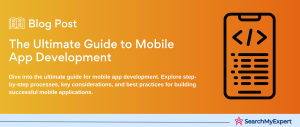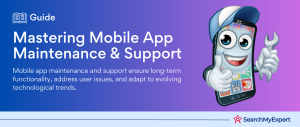Blockchain, often associated with cryptocurrencies, has transcended its initial purpose and is now a driving force in numerous sectors, including mobile app development. As we delve deeper into the digital age, the need for secure, transparent, and efficient systems becomes paramount. Blockchain, with its decentralized nature and robust security features, is poised to redefine the mobile app landscape. Here’s how.
Blockchain: A Brief Overview
Blockchain is a decentralized digital ledger that records transactions across multiple computers. Each transaction is stored in a block, and these blocks are linked and secured using cryptography. The decentralized nature ensures that data is not stored in a single location, and no centralized version exists for hackers to corrupt.
Unparalleled Data Security
Blockchain’s architecture is its crowning jewel. Each block contains a cryptographic hash of the previous block, a timestamp, and transaction data. This makes the data immutable. For mobile app developers, this means an added layer of security. Users can be assured that their data is safe from tampering, providing a trust factor that’s hard to rival.
Transparency Like Never Before
Transparency is at the heart of blockchain. All participants on the network have access to the same data. Any changes to a block require consensus from all participants, ensuring that data remains consistent, transparent, and incorruptible.
Revolutionizing Mobile Payments
Blockchain’s decentralized nature paves the way for faster and more secure mobile payments. Traditional banking systems, with their intermediaries, can slow down the transaction process. Blockchain transactions, on the other hand, are swift, secure, and direct, enhancing the user experience manifold.
Guarding Mobile App Infrastructure
Blockchain’s decentralized domain name system (DNS) is a game-changer. It offers a transparent and distributed DNS, giving developers full control over their domain records. This ensures that the mobile app infrastructure remains impervious to unauthorized access.
Beyond Passwords: The Future of Authentication
The era of remembering complex passwords might soon be behind us. Blockchain offers a more secure and efficient authentication system. Using digital signatures based on public-key cryptography, users can access their digital assets with a private key, ensuring a seamless and secure experience.
Traceability and Accountability
Blockchain’s ability to record transactions in a transparent manner ensures that any information can be tracked in real-time. This is invaluable for apps that require traceability, such as supply chain management. Users can access detailed transaction data, ensuring authenticity and preventing fraudulent activities.
Efficiency at Its Best
Blockchain eliminates the need for intermediaries, leading to faster transactions. Traditional banking systems can take days to process a transaction, whereas blockchain does it in minutes, 24/7.
Cost-Effective Transactions
With no intermediaries involved, blockchain significantly reduces transaction costs. This is a win-win for both businesses and users, leading to more affordable and efficient transactions.
The User Experience Revolution
One of the most significant impacts of blockchain on mobile app development is the enhancement of user experience. In today’s digital age, users demand more than just functionality; they want security, transparency, and efficiency. Blockchain delivers on all these fronts.
Personalized User Experiences
With blockchain, mobile apps can offer personalized experiences like never before. By securely storing user preferences and behaviors on the blockchain, apps can provide tailored content, recommendations, and interfaces that resonate with individual users. This personal touch not only enhances user engagement but also fosters brand loyalty.
Smart Contracts: The Game Changer
Smart contracts, self-executing contracts with the terms of the agreement directly written into code, are one of the standout features of blockchain. For mobile apps, this means automating processes like payments, verifications, and even user agreements. Imagine booking a service through an app, and once the service is rendered, the payment is automatically released without any manual intervention. It’s efficient, secure, and hassle-free.
Decentralized Apps (DApps)
While most of the apps we use today are centralized, blockchain introduces the concept of decentralized apps or DApps. These apps are not controlled by any single entity. Instead, they run on a peer-to-peer network, ensuring that they are always up and running. For users, this means uninterrupted service, and for developers, it translates to reduced hosting and maintenance costs.
Enhanced Loyalty Programs
Loyalty programs are a staple for many mobile apps, but blockchain takes them to the next level. By tokenizing loyalty points on the blockchain, users can easily trade, sell, or redeem them across various platforms. This interoperability enhances the perceived value of these points, encouraging users to engage more with the app.
The Road Ahead
The integration of blockchain in mobile app development is still in its nascent stages, but its potential is vast. As more developers and businesses recognize the myriad benefits it offers, we can expect a surge in blockchain-powered apps.
For users, this means more secure, transparent, and efficient apps. For developers, it’s an opportunity to innovate, stand out, and deliver unparalleled value. The fusion of blockchain and mobile app development is not just the future; it’s the present, and it’s here to stay. Embracing it now can set the stage for success in the ever-evolving digital landscape.
Master the Mobileverse with standout App Development Companies.
Table of Contents
Toggle






